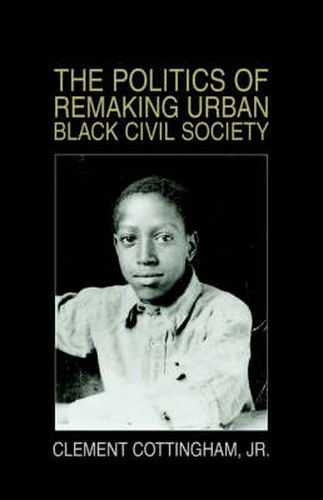Readings Newsletter
Become a Readings Member to make your shopping experience even easier.
Sign in or sign up for free!
You’re not far away from qualifying for FREE standard shipping within Australia
You’ve qualified for FREE standard shipping within Australia
The cart is loading…






This title is printed to order. This book may have been self-published. If so, we cannot guarantee the quality of the content. In the main most books will have gone through the editing process however some may not. We therefore suggest that you be aware of this before ordering this book. If in doubt check either the author or publisher’s details as we are unable to accept any returns unless they are faulty. Please contact us if you have any questions.
Contrary to William J. Wilson who focuses on industrial changes and its consequences for urban social structures, Cottingham examines the trajectory of urban black civil society during its fitful transition out of a politically entrenched racial/caste regime. In the 1930s, a vigorous, though severely segregated, urban black society emerged as southern migrants arrived in New Jersey’s small industrial cities. As it was politically constructed, civil society was founded on a rigid social hierarchy through communicative interactions organized through black newspapers, churches, clubs and civic organizations. With the race-based urban riots of the 1960s, this political order immediately dissipated. As a consequence, the normative walls embedded in the interstices of old black civil society immediately crumbled. In conjunction with economic changes, mutuality within the political realm-the integration of racial, class, gender, and ideological hierarchies-was politically reconfigured in the 1970s and 1980s.
Urban black civil society now existed on a remade political terrain and operated outside the social norms previously embedded in the old regime. Powerful political forces jolted the social realm and spawned alternative communicative discourses embedded within urban black civil society.
In an effort to salvage civil society in the 1980s, New Jersey’s administrative agencies deployed policy regimes to arrest an unfolding urban social order. In the face of surging black identities, interests, and social norms, state authority was restructured in schools, hospitals, and juvenile courts to discipline a subaltern social order. As the politics of national political incorporation advanced in the 1990s, southern black migrants confronted entrenched barriers in their struggle for greater justice and enhanced social equality.
$9.00 standard shipping within Australia
FREE standard shipping within Australia for orders over $100.00
Express & International shipping calculated at checkout
This title is printed to order. This book may have been self-published. If so, we cannot guarantee the quality of the content. In the main most books will have gone through the editing process however some may not. We therefore suggest that you be aware of this before ordering this book. If in doubt check either the author or publisher’s details as we are unable to accept any returns unless they are faulty. Please contact us if you have any questions.
Contrary to William J. Wilson who focuses on industrial changes and its consequences for urban social structures, Cottingham examines the trajectory of urban black civil society during its fitful transition out of a politically entrenched racial/caste regime. In the 1930s, a vigorous, though severely segregated, urban black society emerged as southern migrants arrived in New Jersey’s small industrial cities. As it was politically constructed, civil society was founded on a rigid social hierarchy through communicative interactions organized through black newspapers, churches, clubs and civic organizations. With the race-based urban riots of the 1960s, this political order immediately dissipated. As a consequence, the normative walls embedded in the interstices of old black civil society immediately crumbled. In conjunction with economic changes, mutuality within the political realm-the integration of racial, class, gender, and ideological hierarchies-was politically reconfigured in the 1970s and 1980s.
Urban black civil society now existed on a remade political terrain and operated outside the social norms previously embedded in the old regime. Powerful political forces jolted the social realm and spawned alternative communicative discourses embedded within urban black civil society.
In an effort to salvage civil society in the 1980s, New Jersey’s administrative agencies deployed policy regimes to arrest an unfolding urban social order. In the face of surging black identities, interests, and social norms, state authority was restructured in schools, hospitals, and juvenile courts to discipline a subaltern social order. As the politics of national political incorporation advanced in the 1990s, southern black migrants confronted entrenched barriers in their struggle for greater justice and enhanced social equality.